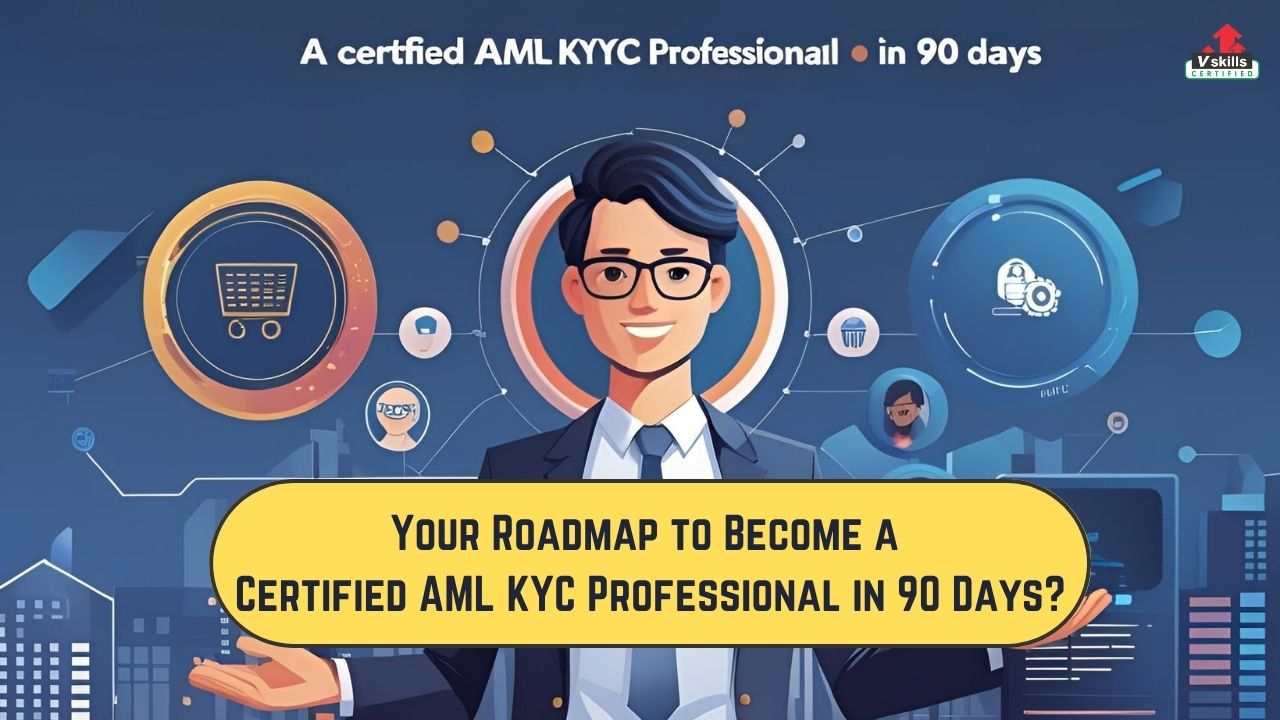In today’s global financial world, where fraud, corruption, and money laundering are growing concerns, the demand for skilled professionals who can prevent financial crimes is at an all-time high. One of the most in-demand skill sets in the banking and finance industry is AML and KYC compliance. Whether you’re a recent graduate looking to break into finance, a mid-career professional seeking a career shift, or someone already working in compliance and aiming to advance, becoming a certified AML KYC professional can significantly boost your career prospects.
This roadmap offers a step-by-step guide to help you understand the core principles of AML and KYC, choose the right certification, master essential skills, and position yourself for success in a competitive job market. It’s not just about passing an exam, but it’s about gaining the knowledge, tools, and confidence to protect financial systems and contribute meaningfully to global financial security. But how do you do it in just 90 days?
This blog gives you a step-by-step, week-by-week roadmap, breaking down what to study, how to prepare, and which certifications can set you apart. Ready to build a future-proof career? Let’s begin.
Overview of AML/KYC Compliance
Anti-Money Laundering (AML) and Know Your Customer (KYC) are two pillars of the global financial compliance framework designed to ensure transparency, accountability, and security within financial systems.
AML (Anti-Money Laundering) refers to a set of procedures, laws, and regulations designed to stop the practice of generating income through illegal actions. The primary goal is to detect and report suspicious activities—such as money laundering, terrorist financing, and fraud—before they compromise the integrity of financial institutions. AML protocols include transaction monitoring, suspicious activity reporting (SAR), risk assessments, and internal audits.
KYC (Know Your Customer) involves verifying a customer’s identity, understanding their financial dealings, and assessing their risk level. It is the first line of defense in combating illicit financial flows. KYC processes typically include:
- Customer Identification Program (CIP): Verifying identity through documents like passports or utility bills.
- Customer Due Diligence (CDD): Evaluating the nature and purpose of the customer’s relationship.
- Enhanced Due Diligence (EDD): A deeper risk analysis for high-risk customers or politically exposed persons (PEPs).
Together, AML and KYC form a comprehensive mechanism that enables banks, fintechs, insurers, and even cryptocurrency platforms to protect themselves from becoming conduits for financial crimes.
Why is it important?
The stakes have never been higher. In an interconnected global economy, illicit money can flow across borders with alarming speed. Governments and regulatory bodies worldwide are working to implement strict punishments for those who do not carry out the needed AML/KYC frameworks.
- FATF (Financial Action Task Force): An intergovernmental body that sets international standards and monitors compliance.
- EU AML Directives (AMLDs): Legal frameworks for member states to prevent money laundering and terrorist financing.
- FinCEN (Financial Crimes Enforcement Network) in the U.S.: Issues guidelines and enforces compliance under the Bank Secrecy Act.
- Other regional regulators: MAS (Singapore), AUSTRAC (Australia), SEBI (India), etc.
There have been many real-world failures that failed to implement these regulations and ended up paying a hefty amount for the same. These are examples set for various other institutes not to take these guidelines as mere rules to be followed. They can cost them as well as their customers, so it is better to be safe than sorry.
- HSBC (2012): Paid $1.9 billion in fines for laundering money for drug cartels.
- Danske Bank (2018): A staggering $230 billion in suspicious transactions linked to its Estonian branch.
- Westpac Bank (Australia, 2019): Faced a $1.3 billion fine for violating AML laws, including failures linked to child exploitation transactions.
These cases highlight not just financial penalties, but reputational damage, executive firings, and stricter regulatory scrutiny. This type of bad press can destroy a company’s goodwill, and in the case of a financial institution, the trust of the employees is all that matters, which can be tarnished forever.
Who is an AML KYC Professional?
- An AML KYC professional specializes in anti-money laundering and knows your customer regulations. This role is essential for financial institutions, ensuring compliance with legal standards to prevent illicit activities.
- These professionals are trained to identify suspicious transactions and verify the identities of clients. They play a crucial part in protecting businesses from fraud and regulatory violations.
The demand for skilled AML KYC professionals continues to grow as regulations tighten globally. Companies value their ability to safeguard assets and maintain trust among customers. Certification usually involves completing rigorous coursework and passing examinations that cover relevant laws, risk assessment techniques, and industry best practices. Being certified demonstrates expertise in navigating complex regulatory frameworks while maintaining ethical practices within organizations. It opens doors to advanced career opportunities in finance, banking, or compliance sectors.
Career Opportunities in AML/KYC
Popular Roles in AML/KYC:
- AML Analyst: Reviews transactions and flags suspicious activity.
- KYC Analyst: Verifies identities and completes due diligence documentation.
- Transaction Monitoring Specialist: Uses tools like Actimize, SAS, or Palantir to detect anomalous patterns.
- Compliance Officer: Oversees AML/KYC implementation, training, and audits.
- SAR Filing Officer: Prepares detailed reports for suspicious activities to regulators.
Compensation and Growth:
- Entry-level (0–2 years): $45,000–$70,000 annually (INR 5–10 lakhs in India)
- Mid-level (3–6 years): $70,000–$110,000
- Senior roles (7+ years): $120,000+ (Global averages; can vary by geography and sector)
Remote & Freelance Trends:
- Freelance Compliance Consulting is on the rise. Especially in fintech, crypto, and RegTech firms, companies are hiring remote AML/KYC specialists on contract to build policies or handle overflow during audits.
- Platforms like Upwork, Toptal, and LinkedIn have listings for AML experts, especially those with certifications.
- Virtual onboarding and digital KYC systems mean geography is no longer a barrier.
Why Get Certified in AML/KYC?
Here are some compelling reasons given below:
High Global Demand Across Industries
Financial crime is a global issue that affects banks, insurance companies, fintech startups, law firms, cryptocurrency exchanges, and even government agencies. Regulatory scrutiny has intensified worldwide due to incidents like the Panama Papers, large-scale bank laundering scandals, and the misuse of digital assets.
Enhanced Career Opportunities and Mobility
Certification opens doors to a broad range of roles such as AML Analyst, KYC Associate, Compliance Officer, Financial Crime Investigator, and Sanctions Specialist. These roles are not only prevalent in banking but are expanding into tech-driven sectors like cryptocurrency, e-commerce, and neobanks. As a certified professional, you position yourself for better job prospects and have greater flexibility to transition between companies, sectors, and even countries, thanks to the internationally recognized nature of many AML/KYC certifications.
Higher Earning Potential
Certified AML/KYC professionals often command higher salaries compared to their uncertified peers. According to industry surveys, individuals holding certifications like CAMS or ICA can earn 20–30% more on average. Employers are willing to pay a premium for proven expertise, especially when compliance failures can result in fines that run into billions of dollars. In addition, certifications can fast-track your eligibility for promotions and leadership roles within compliance departments, risk management teams, or internal audit functions.
Keeps You Ahead of the Curve
AML and KYC regulations are constantly changing to address new threats such as cybercrime, virtual currencies, shell company abuse, and geopolitical sanctions. Certification programs keep you up to date with these developments and prepare you to handle them effectively in real-world settings. Ongoing continuing professional education (CPE) requirements also ensure that certified professionals maintain their relevance over time, keeping your knowledge fresh and actionable.
The AML KYC 90 Days Step by Step Roadmap
Week 1–2: Laying the Foundation
Understand the global regulatory ecosystem and familiarize yourself with the key institutions and frameworks governing AML/KYC.
- Study the FATF 40 Recommendations: These form the backbone of global AML policy.
- Understand the Basel AML Index and Basel Committee guidelines.
- Dive into regional regulators:
- FinCEN (U.S.),
- EU AML Directives (4AMLD, 5AMLD, 6AMLD),
- SEBI/RBI guidelines (India),
- AUSTRAC (Australia), etc.
- Begin reading your official ACAMS/ICA study guide or syllabus.
Week 3–4: Risk-Based Approach and Customer Due Diligence (CDD)
Master the risk-based approach, which is the foundation of all AML/KYC decision-making.
- Learn how to perform customer risk assessments.
- Understand the onboarding lifecycle of KYC documentation, ongoing monitoring, and trigger events for review.
- Study customer types:
- PEPs (Politically Exposed Persons),
- High-risk jurisdictions,
- Shell companies, etc.
Week 5–6: Transaction Monitoring & Red Flag Identification
Learn how to detect suspicious activities using both manual review and technology.
Study common red flags like structuring/smurfing, large cash transactions, round-dollar wire transfers and geographic risk indicators.
Analyze case studies of transaction monitoring failures
Get familiar with monitoring tools like Actimize, SAS AML, Oracle Mantas, Rule-based and AI-driven systems.
Week 7–8: Regulatory Reporting & Internal Controls
Know how to file reports and manage internal compliance programs.
- Learn how to write and submit SARs/STRs (Suspicious Activity/Transaction Reports).
- Understand the components of an internal AML program.
- Review record retention policies and regulatory expectations for documentation.
Week 9–10: Practice, Mock Tests & Real-World Simulations
Cement your knowledge through certifications, simulations, and peer learning.
- Get certified from Vskills in “AML-KYC Compliance Officer” course.
- Simulate real-world scenarios like identifying suspicious behavior in wire transfers.
- Participate in mock interviews or role-plays as a Compliance Analyst.
- Join online groups on LinkedIn, Reddit, Discord and Telegram for study circles.
Week 11–12: Get an authentic certification
Get certified from Vskills in “AML-KYC Compliance Officer” course. The certification is aimed at enhancing the quality of compliance with the directions of RBI in combating illegal operations and movement of funds using banking channels. This will help you in formally updating your resume and help get more job opportunities.
Post certification process
Congratulations, you’ve made it through the 90-day journey and passed your AML/KYC certification exam. But this is only the beginning. Now it’s time to convert your knowledge into action and launch a meaningful career in financial compliance.
Craft a Compliance-Focused Resume
- Start with a professional summary that highlights your certification, risk assessment skills, and knowledge of global AML regulations.
- Include mock projects and samples to demonstrate applied understanding.
Optimize Your LinkedIn for AML/KYC Discovery
- Add your certification in the headline and licenses/certifications section.
- Join and interact with groups like ACAMS – Association of Certified Anti-Money Laundering Specialists and AML Professionals India/Global.
Build a Digital Compliance Portfolio
In today’s competitive market, a digital presence adds credibility.
Use Notion, Google Docs, or a personal website to showcase:
- Case studies based on real-world scenarios
- Mock SAR/STR reports
- Compliance checklists or audit templates
Where to Look for Jobs?
Whether you’re seeking your first role or planning a lateral move, the key is knowing where AML/KYC jobs are actively posted and how hiring trends work.
- LinkedIn: Filter jobs by “AML/KYC,” “Financial Crime,” “Compliance Analyst”
- Glassdoor & Indeed: Ideal for entry-level positions across banking, fintech, and insurance
- eFinancialCareers: Great for global AML roles, especially in Europe, APAC, and MENA
- AMLcareer.com and ACAMS job board: Niche platforms for AML professionals
- Entry-level roles (0–2 years):
- AML Analyst, KYC Associate, Customer Risk Analyst
- Upwork, Toptal, PeoplePerHour:
Companies post short-term AML consulting gigs, onboarding support, and remote transaction reviews. - LinkedIn “Contract” Filters: Increasingly popular for interim compliance professionals in fintech, crypto, and RegTech.
Especially post-pandemic, many AML roles are location-flexible which allows you to work across borders if you understand multi-jurisdictional compliance norms.
Common AML KYC Challenges and How to Overcome Them
Jargon and Legal Language
- AML/KYC is full of acronyms (FATF, EDD, SAR), legal clauses, and policy documents that can feel like a foreign language especially for those without a legal or finance background.
- Create a glossary notebook. Maintain your own “Compliance Dictionary” of terms with examples. This helps reinforce understanding and quick revision.
Time Management
- Balancing certification prep with work, studies, or life responsibilities can be daunting. Many learners drop off due to inconsistent effort.
- Use Google calendars to fix study slots and set time apart for revision and mock tests. Set realistic goals to stay on track without getting burnt out.
Fear of Failure or Technical Exams
- The thought of multiple-choice exams on unfamiliar topics can induce stress and self-doubt, especially for those returning to study after a long break.
- Understand the MCQ Format. Most AML/KYC certification exams are application-based, not just theory-heavy. Use official guides and take timed mock exams weekly.
Expert Corner
Becoming a certified AML/KYC professional in 90 days may sound ambitious, but with a clear roadmap, dedication, and structured learning, it is not only achievable but it can be a game-changing move for your career. In a world where financial crimes are becoming increasingly sophisticated, the need for well-trained professionals who can detect, prevent, and report suspicious activities is more urgent than ever. By committing to this 90-day plan, you are investing in a career that offers long-term stability, global relevance, and the chance to truly make a difference in the fight against money laundering, terrorist financing, and financial fraud.
This journey doesn’t just teach you about regulations and procedures; it develops a mindset focused on integrity, critical thinking, and attention to detail. Along the way, you’ll gain not only technical knowledge but also practical skills in risk assessment, regulatory compliance, transaction monitoring, and customer due diligence. Skills that are valuable in a wide range of roles across banking, fintech, consulting, and even the fast-evolving world of cryptocurrency. Moreover, earning a respected certification gives you credibility and a competitive edge in the job market, helping you stand out to employers and recruiters who are constantly looking for qualified compliance professionals.
The roadmap outlined here, from choosing your certification, mastering the key concepts, and preparing for the exam to building your resume and acing job interviews, provides you with a complete, step-by-step guide to launch or accelerate your career in compliance. And while this 90-day journey is intensive, it is also flexible, allowing you to learn at your own pace while staying focused on your goal. Remember, the most successful professionals are those who continuously adapt, learn, and stay updated with global regulatory changes and this certification is just the beginning. So, whether you’re starting fresh or switching careers, this is your opportunity to step into a high-impact profession that not only opens doors but also empowers you to be a guardian of financial transparency and integrity in an increasingly complex world.




